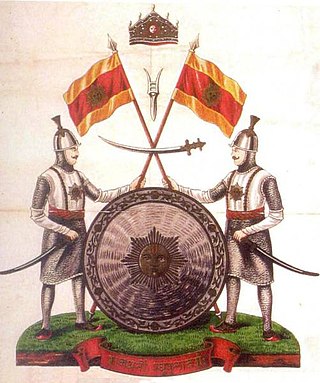Chugh is a surname found in India
Notable people with the surname include:
- Kirpal Singh Chugh (1932–2017), Indian nephrologist
- Vir Singh Chugh (1882–1957), Indian poet
Chugh is a surname found in India
Notable people with the surname include:
Pawar is an Indian surname found among the Maratha, Mahar or Koli people in Maharashtra.
Bisht is a surname found in the country of Nepal and the Indian state of Uttarakhand, Himachal Pradesh. Bisht was a title given by kings to nobles, derived from the Sanskrit vishisht ("distinguished").The term "Bisht" originally referred to someone who held a land grant from the government. The Bisht families in Uttarakhand were chiefly Thokdars(Zamindars) of Thuljat origin. In Uttrakhand, Bishts are generally Kshatriya Rajputs. In Nepal, Bisht was adopted as a surname by Raute and Raji people. Bishta, as Bista, was also used as a surname used by Khas people, group under the caste Chhetri.
Bajwa is a Jat surname and tribe name commonly found among the Sikhs, Muslims of the Punjab region in India and Pakistan.
Virk is a last name used by Sikhs in Punjab, India, which is based on that of a Jat clan supposedly founded by a Rajput called Virak.
Dhillon is one of the largest Jat clans found in the Punjab region of India and Pakistan. Dhillon sardars (chiefs) ruled the Bhangi Misl in the Sikh confederacy.
Aulakh is a Jat clan in the Punjab region of India and Pakistan.
Sangwan is a surname of the Jat people found in the Indian state Haryana and Uttar Pradesh.
Pathania is a surname of Indian origin. It is a sub-clan of Tomar/Toor Rajput clan from northern India; the royal family of the Nurpur kingdom belonged to this clan.
Atwal or Athwal is a Sikh family name derived from a tribe of Jats. It is also a Jat clan.
Panesar is an Indian surname from Punjab. Notable people with the surname include:

Jamwal is a toponymic surname for a Dogra Rajput clan of the same name from Jammu, in Jammu and Kashmir, India. They claim descent from the traditional founder of Jammu, Jambu Lochan, and there at one time some of their members were rulers of the princely state of Jammu and Kashmir, often referred to as the Dogra dynasty.
Kalsi is a famous Tribe of Tarkhan Sikhs also known as Ramgarhia Sikhs.
Bindra is a Punjabi surname found among Jats & Khatris. Many Bindra Khatris were located in Rawalpindi district.
Shokeen is a surname. Notable people with the surname include:
Gambhir is an Indian surname.
Sekhon is a surname and a Jat clan in the Punjab region.
Gujral is an Indian (Khatri) surname.
Airee or Airy or Airi is a Chhetri and Pahadi Rajput surname found in Nepal and Uttarakhand, India. Notable people with the surname include:
Negi is a title of Pahadi Rajput or Thakur. The Negi title originated from the word ‘nek’ which means ‘righteous’. This title was conferred by kings, warriors, and ministers. Individuals holding the Negi title were entrusted with the task of collecting taxes from villages. They were given a percentage of the amount collected as remuneration. origin found in the Indian states of Uttarakhand, Himachal Pradesh and Jammu.
Dhami is a Punjabi & Nepali surname. Notable people with the name include: